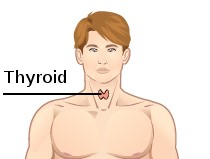thyroid
Written by Dr. Claire Arcidiacono, ND
For further questions or concerns email me at [email protected]
The thyroid has many important functions in the body, but how much do you really know about it? Today, we get into the basics of the thyroid.†
What is the thyroid?
What exactly is a thyroid gland? Well to start off with, what is a gland? A gland is a type of organ that makes hormones or other secretions that “get stuff done.” There are two types of glands. One is called endocrine, the other is called exocrine. What does that mean exactly? Well it basically means that one type, the endocrine, secretes its hormones directly into the blood stream vs exocrine, which secretes its products into a “duct.” The thyroid is an example of an endocrine gland, since its hormones go directly into the blood. In contrast, sweat glands are exocrine type glands. (1) There are other differences in what is produced, but these are the main differences.†
The thyroid gland is located in the front of the neck and is shaped like a butterfly. This is what the doctor feels when he asks you to cough while he is palpating your throat.† (2)

The thyroid gland secretes three hormones. The first is Triiodothyronine or T3, which is the active form of thyroid hormone. The second is Thyroxine or T4. This is used to make T3. The last hormone is called calcitonin and it affects calcium and bone building.† (3)
HOW TO BE PROACTIVE ABOUT BONE HEALTH – INVITE HEALTH PODCAST, EPISODE 232. Listen Now>>
The thyroid doesn’t just decide to produce hormones. It is controlled by an enzyme called thyroid stimulating hormone or TSH. This is produced by the anterior pituitary gland. This is in turn controlled by another hormone. However that is outside the reach of this article.† (4)
The role of this gland
The thyroid is one of the most important glands in our body. It is in control of almost every system! To start off with the thyroid is in charge of “metabolic rate.” By metabolic rate, we mean body temperature, appetite, regulation of weight (aka weight gain and weight loss), and absorption of our nutrients from food, as well as blood sugar and cholesterol levels.†
The thyroid also affects the heart rate. In addition to the heart, the thyroid affects brain development in a fetus and memory in adults and children. Similarly, it also affects sleep patterns and quality. Those with thyroid disorders tend to suffer from either too much energy or too little energy!†
Sexual health such as libido, and maintenance of healthy menstrual cycle are also affected by the thyroid.†
BIRTH CONTROL PILLS AND VITAMIN DEFICIENCIES – INVITE HEALTH PODCAST, EPISODE 514. Listen Now>>
Healthy hair, skin, nails, as well as bone health, are all controlled by the thyroid.† (5)
What does this all mean? It means that the thyroid is in control or related to almost every system in our body. It controls them either directly via its hormones or via its hormones relationship to other hormones.†
Just like any other organ, things can go wrong with the thyroid. I won’t get into detail here since this is an introduction to the thyroid. I will be writing about each of these in more detail in later articles. The main two dysfunctions of the thyroid are hyper- and hypothyroidism. Also related to these two are nodules and goiters or in other words “growths of the thyroid.” While I will be discussing natural approaches to thyroid health, it is important to understand that thyroid supplements are very strong. They do not prevent disease, but rather are used to treat a condition. Using them to “prevent” a problem can actually cause problems later on. Unfortunately, there is really not prevention when it comes to thyroid.†
My article next week will be discussing thyroid labs and what they mean. It is important to know what the labs mean before we can get into treatment.†
For further questions or concerns related to the thyroid, email me at [email protected].
Sources
(1) https://thebiologynotes.com/exocrine-vs-endocrine-glands/
(2)Standring S, Borley NR, et al., eds. (2008). Gray’s anatomy : the anatomical basis of clinical practice (40th ed.). London: Churchill Livingstone. ISBN 978-0-8089-2371-8.
(3)Hall JE, Guyton AC (2011). Guyton and Hall textbook of medical physiology (12th ed.). Philadelphia, Pa.: Saunders/Elsevier. ISBN 978-1-4160-4574-8.
(4)Boron WF, Boulpaep EL (2012). Medical Physiology (2nd ed.). Philadelphia: Saunders. p. 1052. ISBN 978-1-4377-1753-2. \
(5)Boron WF, Boulpaep EL (2012). Medical Physiology (2nd ed.). Philadelphia: Saunders. p. 1052. ISBN 978-1-4377-1753-2.

